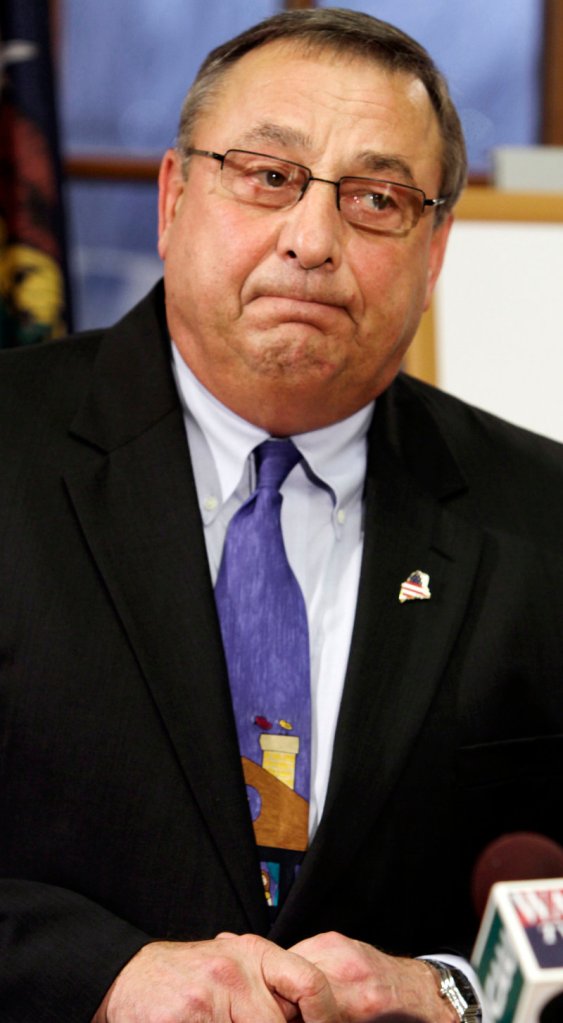Reiterating his call for the need to cut human services programs to save money, Republican Gov. Paul LePage on Saturday said there are more Mainers receiving welfare benefits than there are income tax filers paying taxes.
But critics said LePage’s numbers are wrong and are designed to win political support for cuts to programs that have nothing to do with welfare.
The governor said in his weekly radio address that Maine had 453,000 people receiving welfare benefits in 2010. At the same, he said, the state had only 445,000 people who paid taxes.
LePage said he doesn’t relish the thought of people being hurt by spending cuts, but said it isn’t fair to cover the $221 million Medicaid funding shortage by raising taxes or asking other state agencies to make up the difference. Rather, the state needs to rein in Medicaid costs and restructure the program, he said.
“There is no joy in taking anything away from anyone,” the governor said in his address. “But there is one question I need to ask: Why should people struggle in this economy to pay their state taxes while the state of Maine operates far outside the national average in welfare costs? It’s a fair question.”
Democrats say that the governor’s definition of welfare is overly broad and that his definition of taxpayer overly narrow — resulting in a statistic that has no relevance to the real world.
“The governor is flat wrong. In fact, he has it backwards,” said Rep. Seth Berry, D-Bowdoinham, the ranking Democrat on the Legislature’s Taxation Committee, in a statement released after the governor’s radio address.
Berry said that all Maine residents pay taxes whenever they buy anything. They also pay taxes if they own a car. All homeowners pay property taxes, he said, and apartment dwellers indirectly pay property taxes through their rent.
When all local and state taxes are taken into account, the families who are in the bottom 20 percent in terms of income have the highest tax burden of any income group, according to 2009 data provided by the Maine Revenue Services, noted Garrett Martin, executive director of the Maine Center for Economic Policy, a liberal research group.
“This is an unfortunate mischaracterization of what’s at stake here,” he said of LePage’s radio address. “While some people don’t earn enough to have an income tax obligation, they are still paying taxes that support a range of programs and services.”
Christine Hastedt, policy director at Maine Equal Justice, a legal services program that represents low-income people, said that the actual number of Mainers who paid income taxes is much higher than LePage claims because the 445,000 figure he cites does not represent the number of individuals but the number of filed returns. Married couples typically file one return, she said.
Hastedt also took issue with the governor’s use of the term “welfare.” When people think of welfare, they think of programs such as food stamps and Temporary Assistance for Needy Families, not programs that allow seniors to buy prescription drugs at Medicare prices or pay the nursing home care for people suffering with Alzheimer’s disease.
“I do not think that seniors in a nursing home think of themselves as getting welfare, or a senior who has worked their whole life getting a little help with prescription drugs,” Hastedt said.
The LePage administration has proposed Medicaid cuts that could leave up to 65,000 people without health insurance coverage. LePage says the cuts are necessary to avoid a fiscal crisis due to unsustainable Medicaid costs.
LePage spokeswoman Adrienne Bennett said that if more people paid income taxes than the tax filings indicate, as Democrats argue, then it’s also fair to say that more people received welfare benefits than the numbers suggest. The welfare numbers, for the most part, represent individuals who receive benefits, she said, but the reality is that many of the benefits help recipients’ families as well.
“If the Democrats are saying the tax numbers are higher, those welfare numbers need to be higher as well,” she said.
Sen. Earle McCormick, R-Hallowell, co-chair of the Legislature’s Health and Human Services Committee, said that LePage wants Maine to have the same level of benefits as in other states. That would mean cuts for some service levels, he said.
Still, after listening to three days of public testimony, he believes that the Legislature will have to do “a lot of work” on the governor’s proposal before it’s ready for action. He said lawmakers have questions about how many people would be affected by the cuts and about the reason for the budget shortfall.
He said the Health and Human Services and Appropriations committees will start to get some of those answers when they meet Tuesday.
There is a stigma attached to the word “welfare,” he acknowleged, and there is a perception among many in the general population that the system is abused. At the same time, he said, he would not use the term “welfare” to describe programs slated for cuts, such as Head Start or programs that pay for nursing home care for mentally ill or physically disabled people.
“Something needs to be done, but we can’t throw people out on the street either,” he said. “The governor is fully committed that we have a safety net for those really in need. We just have to find what that balance is.”
Send questions/comments to the editors.


